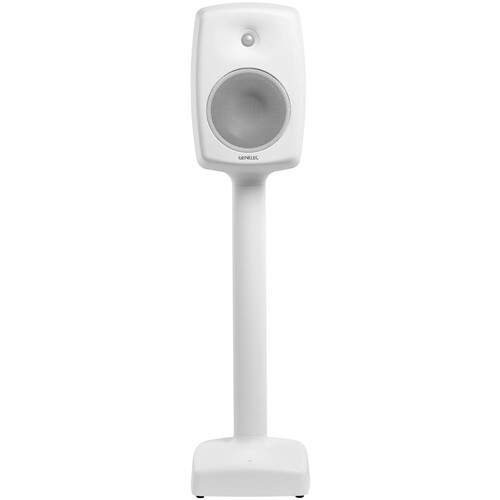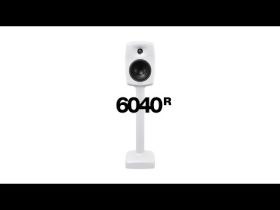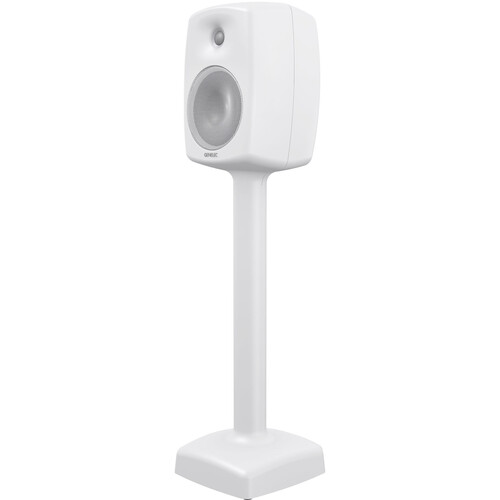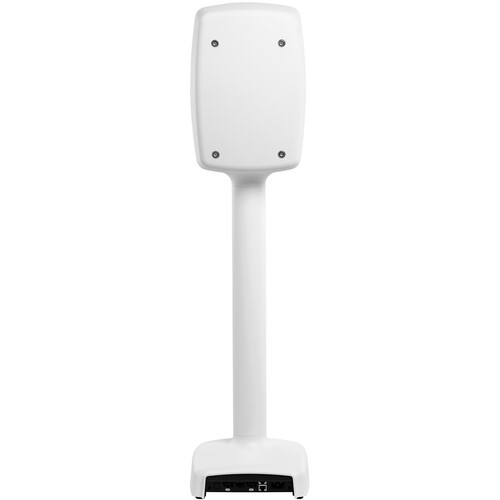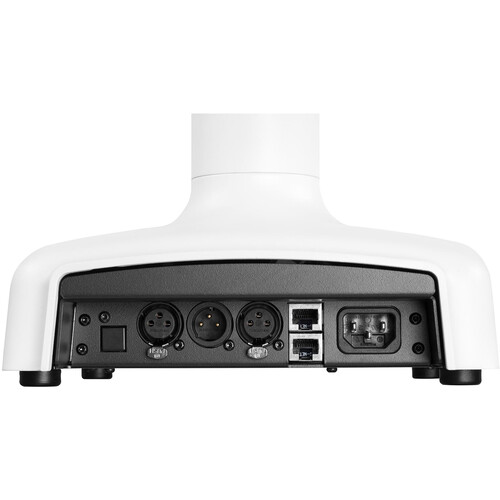Fusing the very best of Finnish technology and design, the white Genelec 6040R Smart Active Standing Loudspeaker is an elegant and powerful loudspeaker that can handle the most challenging acoustic environments and deliver clean, consistent audio in everything from spacious, uneven living rooms to professional studios. The 6040R is designed to be the aural and visual centerpiece of any listening environment and transfers sound evenly and uncolored, thanks to the low-diffraction qualities of its curvy, aluminum body.
The 6040R has a plethora of I/O including an analog XLR input, digital XLR AES/EBU input and output/thru, and two RJ45 Cat 5 network ports, which enable remote control of the speaker via the powerful GLM software, which makes it easy to automatically calibrate the speakers for any room, and make adjustments to treble, bass, and low bass settings. This active loudspeaker comes complete with an integrated stand for isolation and easy placement as well as a mains power cable and a 16 RJ45 cable to get you started right away.
Networked Smart Active Monitor (SAM)
Built upon the solid electro-acoustic foundations of the 1200, 8000, and 7000 Series products, Genelec advanced SAM Systems are among today s most advanced and flexible monitoring solutions. They are an indispensable tool for audio professionals, as they are capable to automatically adapt to the acoustic environments and correct for levels, delays, and room anomalies. SAM Systems can be controlled via Genelec proprietary Loudspeaker Manager (GLM) network and software, enabling you to build a highly flexible and reliable monitoring system.
The GLM 3 software is a highly intuitive and powerful monitor control networking system that manages connectivity to all SAM studio monitors and subwoofers on the network, up to 30. The GLM 3 software features adjustment of levels, distance delays, and flexible room response compensation equalization with the state-of-the-art and robust AutoCal automated calibration system. All parameters and settings are stored in system setup files or saved in each individual monitor or subwoofer if the GLM network needs to be disconnected.
Directivity Control Waveguide (DCW)
The DCW technology shapes the emitted wavefront in a controlled way, allowing predictable tailoring of the directivity (dispersion) pattern. To make the directivity uniform and smooth, the goal is to limit the radiation angle, so that the stray radiation is reduced. It results in excellent flatness of the overall frequency response as well as uniform power response. This advanced DCW technology minimizes early reflections and provides a wide and controlled listening area, achieving accurate sound reproduction on- and off-axis.
Minimized early reflections and controlled, constant directivity have another important advantage: the frequency balance of the room reverberation field is essentially the same as the direct field from the monitors. As a consequence, the monitoring system s performance is less dependent on room acoustic characteristics.
- Flat on- and off-axis response for wider usable listening area
- Increased direct-to-reflected sound ratio for reduced control room coloration
- Improved stereo and sound stage imaging
- Increased drive unit sensitivity up to 6 dB
- Increased system maximum sound pressure level capacity
- Decreased drive unit distortion
- Reduced cabinet edge diffraction
- Reduced complete system distortion
Active Crossover
Electronic crossovers allow to split the audio signal into separate frequency bands that can be separately routed to individual power amplifiers, which then are connected to specific transducers optimized for a particular frequency band. Genelec analog active crossover filters contain electronic components that are operated at low signal levels suitable for power amplifier inputs. This is in contrast to passive crossovers that operate at the high signal levels of the power amplifier s outputs, having to handle high currents, and in some cases, high voltages.
Using the active approach enables frequency response adjustments and optimization of the full loudspeaker system, placed in various room environments, without expensive external equalizers. The end result is a simpler, more reliable, efficient, consistent, and precise active loudspeaker system.
ISS and Circuit Protections
The Intelligent Signal Sensing, ISS circuitry tracks the signal input of the loudspeaker and detects if it is in use. If the ISS circuit does not find any audio on the input for a period of time, it sets the loudspeaker to a low-power sleep state and the loudspeaker will consume less than 0.5 watts. When an input signal is detected, the loudspeaker immediately turns itself on. Basically, the loudspeaker system will start saving power as soon as work is interrupted.
On top of the ISS protections, each driver also has special protection circuitry. The protection circuitry prevents driver failures by detecting signal levels, and in case of sudden peaks or constantly too high levels, taking the signal level down automatically. Of course, this feature does not affect the sound quality in any way when working within the specifications of the loudspeaker, but only prevents inadequate input signals from breaking the loudspeaker.
Minimum Diffraction Enclosure (MDE)
A common problem with standard free-standing loudspeakers is that the front baffle discontinuities cause diffractions and the loudspeaker sharp corners act as secondary sources through reflections. In order to improve the flatness of the frequency response and the power response of free standing loudspeaker systems, Genelec have designed a highly innovative enclosure optimized to match the properties of the monitor drivers, featuring rounded edges, and gently curved front and sides. In addition to achieving an unsurpassed flatness of the frequency response, the enclosure having minimum diffractions yields superb sound stage imaging qualities.
The DCW waveguide has been integrated in the MDE aluminum enclosure to provide improved control of the loudspeaker s directivity. Basically, the low-frequency limit for constant directivity is determined by the size of the waveguide, so the larger the surface the better the control. With a very controlled off-axis radiation, the listening window becomes consistent, which is of utmost importance with multi-channel audio monitoring. Controlled directivity also reduces possible first-order reflections on surfaces near the loudspeaker, helping to provide consistent audio reproduction in different acoustical environments. In fact, the entire front baffle is gently curved and the acoustically transparent grilles are part of the outer cabinet aesthetics, blending perfectly with the various other curved surfaces.
Two Drivers, Two Amplifiers
In a typical 2-way loudspeaker system, the active crossover needs two power amplifiersa one for the woofer and one for the tweeter. The power amplifiers are connected directly to the drivers of an active loudspeaker, resulting in the power amplifier s load becoming much simpler and well known. Each driver-specific power amplifier has only a limited frequency range to amplify (the power amplifier is placed after the active crossover) and this adds to the ease of design.
- One 6.5 cone woofer and one 3/4 metal dome tweeter
- Dedicated per channel amplifiers, 150W class-D HF amp, 150W class-D LF amp
- The power amplifiers are directly connected to the speaker drivers, maximizing the control exerted by the power amplifier s damping on the driver s voice coil
- No loss between amplifier and driver units results in maximum acoustic efficiency
- Active technology achieves superior sound output
- All 6040R loudspeakers are delivered as a factory-aligned system
Genelec 6040R Specs
| Monitor Type & Configuration | Active 2-Way |
| Number of Included Monitors | Single Monitor |
| Enclosure | Sealed, Shielded |
| Total Power Output | 300 W |
Drivers
| Tweeter | 1 x 0.75" / 19.1 mm Metal Dome |
| Woofer | 1 x 6.5" / 16.5 cm Cone |
| Amplifiers | LF: 1 x 150 W Class-D HF: 1 x 150 W Class-D |
Performance
| Frequency Response | 50 Hz to 20 kHz ± 1.5 dB |
| Maximum Sound Pressure Level (SPL) | 118 dB (Peak) |
| Signal-to-Noise Ratio | 110 dB |
| Total Harmonic Distortion (THD) | <0.01% |
| Maximum Input Level | +25 dBu |
| Analog Input Sensitivity/Gain | +6 dBu to -6 dBu (Continuously Variable) |
| Self-Generated Noise | Less Than 5 dB (at 3` / 1 m) |
| Protections and Limiting | Driver Protection |
Signal Processing
| EQ | 2 x LF Shelf 2 x HF Shelf |
| Filters | 16 x Parametric Notch Filter |
| Parametric EQ | None |
| Crossover Frequency | High-Pass: 2.6 kHz |
| Crossover Type | Active |
| Phase Adjustment | None |
| App-Based Signal Processing | GLM Software Adjustment |
Connectivity
| Audio I/O | 1 x XLR 3-Pin Balanced Input (10 Kilohms) |
| Digital Audio I/O | 1 x XLR 3-Pin AES3 Input 1 x XLR 3-Pin AES3 Output |
| Network I/O | 2 x RJ45 Ethernet |
| USB | None |
| Wireless | None |
Power
| AC Input Power | 100 to 240 VAC, 50/60 Hz |
| Power Consumption | 12 W (Idle) 180 W (Maximum) |
| Color | White |
| Enclosure Material | Aluminum |
| Mounting Points | None |
| Dimensions (W x H x D) | 9.3 x 39.3 x 8.7" / 23.7 x 99.9 x 22 cm |
| Weight | 32.8 lb / 14.9 kg |
In the Box
- Genelec 6040R Smart Active 6.5" 300W Standing Loudspeaker (White)
- RJ45 Cat 5 Network Cable (16.4`)
- Mains Cable
No posts found

